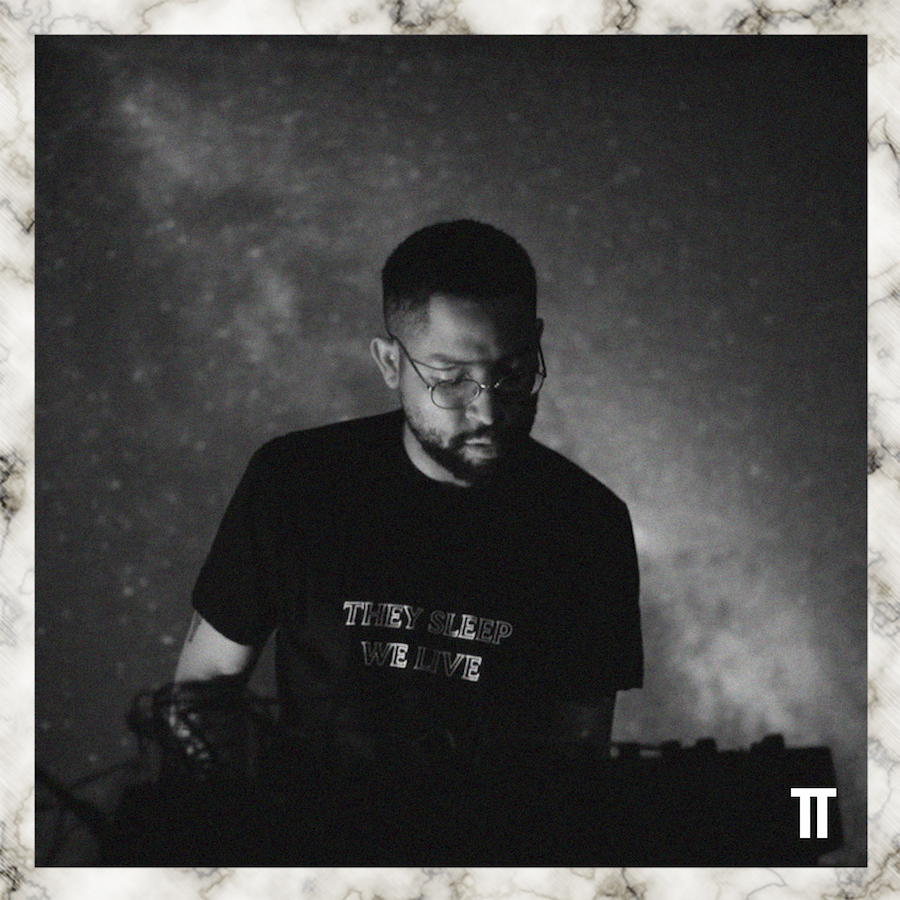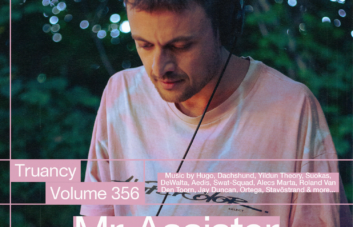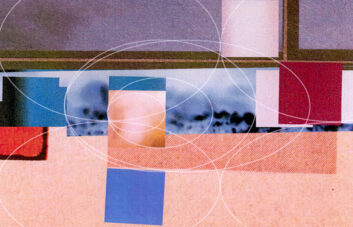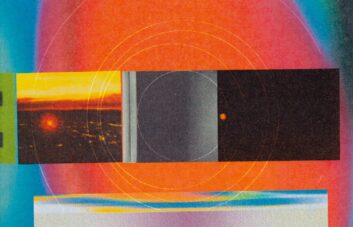Originally from Bermuda, the now Bay Area-based producer Russell E.L Butler has spent the last eight years in Oakland decolonizing their music process through a method of improvisation and empathic intuition, all the while taking influence from the culture of the island and the black, queer diaspora. Their music and work, often steeped with themes and connotations of spirituality, healing and literature has been met to much acclaim, with their ‘God Is Change’ EP from three years ago being a perfect starting point for those only just being introduced to Russell’s work. The EP, charted the story of Lauren Olamina, a queer, black woman who discovers her own religion, Earth Seed, during a dystopic period in the not too distant future. Since 2014, their music under their own name has found its way to other labels such as Opal Tapes, Jacktone, Black Opal and more recently CGI Records with their ‘Dropping Out Of Life’ EP, a record described as commitment to life after experiencing the harrowing events of the Ghost Ship fire from last year. We caught up with Russell to discuss their Bermuda influences, their current live set and the frustrations and contradictions of being a person of colour living in Oakland.
Hey Russell, thanks again for taking out time to answer some questions, sorry for delay on them. Just for starters, let’s go way back and talk about your move to the Bay Area, as I understand you’re originally from Bermuda. Was it music that inspired the move at all? “I’ve been living in the US for 14 years now and have officially been in the Bay Area for eight of those. I lived on the East Coast of the US (Boston, Pennsylvania) for school prior to that. The music is definitely something that inspired the move. The hyphy movement broke while I was in school in Boston and seeing hiphop that was so fun, raw and psychedelic was incredibly inspiring. In addition to that, the Bay Area has been host to many social movements, and artists had their role in that. Emory Douglas’s work with the Black Panthers, the work of Don Buchla, Pauline Oliveros and others in the development of synthesis at the SF Tape Music Center, the development of the Rave Scene in the 90s, etc. One of the primary creators (Dave Smith) of MIDI started in and still operates in the Bay.”
Speaking of Bermuda, just seen you played live there for the first time back in March. How was that? “Really incredible. To be a Bermudian artist is, typically, to be an artist in exile. There isn’t much of an infrastructure there to be a professional artist and pay all of your bills. It’s still a struggle in the US, but there are many more opportunities to express yourself, get work, and survive. However, as a diasporic artist, there remains a responsibility to expand the narrative of what it is to be Black or Bermudian or any other kind of marginalized identity. A lot of my work has to do with showing Bermudians that they can do anything and be anyone. I didn’t really have an artist that I could look up to, who was local, while I was growing up. Any step forward is one for the culture. So, to return home and play in the coffee shop that helped mold me into the artist I am today, was unreal. There were folks in the crowd that knew me in Primary school, but didn’t recognize me until after I played. There were also a lot of folks that came up to me after saying that they didn’t think they liked techno. I love to convert folks with my sets because I didn’t understand techno until it was presented to me in proper context.”
You mentioned in an old interview that you were hoping to bring what you’ve learned from the Bay Area back to your home country, so that young Bermudians can also have a chance to influence and expand on Bermudian culture. “This work is a bit passive at the moment. There are still many things for which I am (I think) the first Bermudian; playing Moogfest, being featured by Moog Music, playing at EMPAC, etc. Though it is unfortunate to admit how low the bar currently is, I feel and hope that my visibility is having an impact on queer, black, marginalised youth in Bermuda. I’m starting to plan some projects that will bring me there in a more active capacity, but for now, planning.”
Do you find Bermuda’s influence still lingers whilst in the Bay Area? “I still go back at least once a year and have family there. Bermuda, specifically that part of the Atlantic, is my spiritual home and my work has very spiritual connotations. If I’m away for too long I get a bit lost, my psychic bearings become a mess. I need to return to that part of the ocean to recharge spiritually, reconnect with the water, my family, my friends, my memories. This energy is integral to my practice when I return to the US. In the book Aurora by Kim Stanley Robinson, the author explains that humans in the future can travel within and outside of the solar system. However, if they don’t return to Earth every once in a while, they get really sick. I feel like that is the most accurate description of what happens to me when I don’t return.”
So going back again, what were the first steps for you in starting to produce your own tracks? Did you have any musical training or were you teaching yourself as you went? “I was classically trained on the violin from the ages of 4-13. I eventually learned and played the Alto Sax for school and then got into the guitar. The guitar was the first instrument I started composing on. I wouldn’t learn how to produce or what production even was until college. While I was at school I learned to record and had a few experimental projects that I would try different methods of recording for. Once I moved to the Bay Area, I decided to try learning Logic to record and sequence and eventually got into just recording live electronic instruments. My musical training made me a fast and adaptable learner, but it did hold me back when trying to break traditional “colonised” modes of composition. Part of my practice since then has the decolonisation of my process thru playing a-rhythmically, atonally, and improvisationally.”
Is this practice you adopt for your live set? As someone who’s never seen you play what can you tell us about your live set? Are there any sort of process and changes you’ve gone through the over the years to get to your current setup? “My live set up has made many changes over the years, but there are a few consistencies:
– Making the set up as portable as possible. This approach is particularly meaningful because it places some automatic constraints on how I approach composition. I am my own roadie, so if a pedal has proven to be unneccesary, it gets cut. This also stems from being an immigrant and never knowing when or where you’ll end up. For example, my current setup for my EU tour is one 6u case of Eurorack.
– The modular synthesizer. This is my primary instrument. It is always challenging me to be better and play better. It has also had a great impact on my studio practice, as it allows me to interface with other pieces of equipment in new and exciting ways.
– Improvisation and empathic intuition. I build my sets around improvising because it allows me to have an immediate and visceral connection with the audience. If I can connect on a deep level with at least one person in the room, that will direct the set. I also try to process the emotions and physicality of the audience and spit it back out to give them something they weren’t expecting, but that they were looking for.
– Dancing, always dancing”
In a two part question can you tell us how you went about making that ‘Manipulate’ video with Ian Colon? Had you two been friends before? Also in the statement you mentioned how you wanted to capture the sense of contradiction and frustration that you feel as people of color living in the Bay Area. Although people can watch the video to gage some those feelings was wondering if you could tell us about some of those frustrations and contradictions? “Ian Colon is one of my oldest friends and collaborators. We met on our first day at art school and have lived together many times. We are both light skinned, queer, black people (he’s a cis man, I’m non-binary) that grew up in privilege. This privilege allowed us access to good education, financial stability, broad career options, and access to majority white institutions. The contradictions arise because despite our access we are still subjects under white supremacist capitalist patriarchy. Though we are the embodiment of our ancestors’ wildest dreams, we are still burdened by the growing police state, institutional racism, and processing the trauma of our ancestors. We balance this with our creative practices, which are ironically facilitated by this system. MANIPULATE is a step forward in decolonizing our consciousnesses so that we can push for a more equitable society, thru tangible, non-violent, physical actions.”
What can you tell us about the project ‘Black Jeans. You had some releases on Tundra Dubs and AMDISCS around 2011-2013 but the project seems to have gone quiet on the production front anyway/ Was this to make way for you own-name projects? What can you tell us about that time? “Black Jeans started in 2009 as a recording project. It was my first real foray into composed electronic music. It was an outlet for much of the depression and anxiety I was feeling around immigrating to the US, my relationships, and my ancestral past in Bermuda. I put it on the back burner to focus on becoming a better singer and producer. Plus the Black Jeans project exists in it’s own eco-system, which I found to be too restrictive on the rest of my practice, hence the move to using my own name. I also have to credit Mat Dryhurst for this shift as he was the one that really worked on me to make the change. Black Jeans will be coming back soon, tho!”
What can you tell us about the mix you’ve done for us this week? “This mix is a reflection of my style as a regional Bay Area DJ. It features a few records that I bought at Submerge in Detroit. Detroit often comes up in the criticism around my work, which has made me uncomfortable because I hadn’t been there until this year. I still can’t say that I am a part of that lineage, but I have a much better understanding for what people really mean by Detroit when they say it. Despite this, I am influenced by many Detroit artists, but the only places that I can claim are Bermuda and Oakland. This mix is a reflection of how I have come to define myself as a Bay Area DJ. Not genre specific, not time period specific, long mixes, and lots of psychedelia. In terms of process, it’s a one take vinyl mix. I like a little slop cuz I want you to hear me work for it. One of the things I love about djing is that it’s an opportunity for people to watch someone problem solve in real time.”
What else can we expect from you for the rest of the year and possibly next? Anything in store you can share? “I’m on tour right now in the EU, hoping for a couple of more dates, so we’ll see. I’m hoping that this tour will be the first of many, so I’ll be looking for an EU/UK booker during my trip. I recently signed on with Surefire for North/South America. I’m finishing up a vinyl album for a label based in SF, along with making tracks for other EP offers. I’ve taken the dive into making my art practice my primary job and with that I’m hoping to get more residencies, tour more, and work on sound design and scoring for film and TV.”
Russell E.L Butler: Facebook, Soundcloud, Website, Twitter




